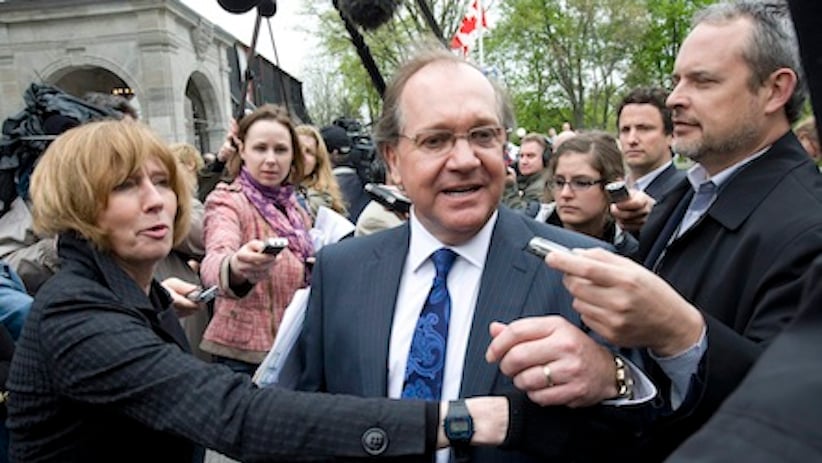It’s deadline day for First Nations financial disclosures
New law ‘leaving a bad taste in everyone’s mouth’
Minister of State (Atlantic Canada Opportunities Agency) Bernard Valcourt speaks with media after being sworn in at a ceremony at Rideau Hall in Ottawa, Wednesday May 18, 2011. THE CANADIAN PRESS/Adrian Wyld
Share

The deadline arrived on Wednesday for First Nations to comply with controversial new federal rules requiring them to publicly disclose details of their finances—including the salaries of local chiefs and councillors—and some bands are refusing to file the figures Ottawa is demanding.
The most explicit challenge to the First Nations Financial Transparency Act came from the Onion Lake Cree Nation, which filed a statement of claim in an Edmonton court disputing the law’s legitimacy. The Onion Lake band straddles the Alberta-Saskatchewan border, and its legal action seemed to have wide support among other First Nations in the region.
Still, a large majority of bands are respecting the law. The Department of Aboriginal and Northern Affairs was still scrambling to process last-minute filings under the law this afternoon. A departmental official said details on how many of the 582 First Nations covered by it have complied will not be posted on a federal website until sometime Thursday. But, by early afternoon Wednesday, more than 500 had submitted the required documents. (UPDATE: By late evening, 521 of the 582 bands required to comply had filed their disclosure documents.)
For several months, Maclean’s has been tracking the filings as they are posted individually on the department’s website. By earlier this week, we were able to tabulate salary details for 495 First Nations communities. Of those bands, the median chief’s base salary was $62,140. Income earned on reserves is not subject to income tax, however, so that’s the equivalent of about $80,000 in taxable income.
Cameron Alexis, the Alberta regional chief for the Assembly of First Nations (AFN), the national Aboriginal organization, said the typical income of a chief around the middle of the pack is not likely to cause much controversy on First Nations reserves, or, ofr that matter, among other Canadians.
That’s one reason why, Alexis said, most First Nations are not fundamentally opposed to financial transparency, even for salaries. Their core objection to the new law is the way the Conservative government imposed it, and some elements of what must be made public. “It’s the manner in which it has been presented,” Alexis said. “We need absolute buy-in and [the AFN] needs to vote for it.”
But Alexis said that, while it’s generally fine to ask bands to publicly reveal how they spend money transferred to them by Ottawa, he disagrees with requiring them to be equally open about how they allocate their so-called “own-source revenues”—often, profits from band-owned enterprises. Some of the top-paid chiefs lead bands that rake in significant profits from resource-industry, real estate or other ventures.
Of the 495 filings Maclean’s examined, 48 First Nations paid their chiefs base salaries of more than $100,000. For 150 of the 495, the chief’s total remuneration—including base salary plus expenses, along with pay for other jobs the chief might do for the band—topped $100,000. But Alexis said those total remuneration figures should not be confused with ordinary salary, since the totals include, for instance, inevitably high travel expenses for chiefs from remote reserves.
As well, Alexis said the law should not require bands to disclose payment to chiefs and councillors that come from First Nations businesses. “First Nations are slowly starting to get out of poverty, some of them, by using own-source revenues. And now, all these reporting requirements are sort of leaving a bad taste in everyone’s mouth, to some degree.”
It isn’t clear how federal Aboriginal Affairs Minister Bernard Valcourt will deal with bands that defy his new law. A federal official said one possibility is seeking court orders to compel them to fall into line, while another option is cutting off “non-essential funding.” That would mean federal funds earmarked for band administration, including salaries, but not for services such as education and health.
An earlier Maclean’s story on the salaries of local First Nations politicians can be found here. A story about one of the highest-paid chiefs, and an interview justifying that high six-figure salary, is here.